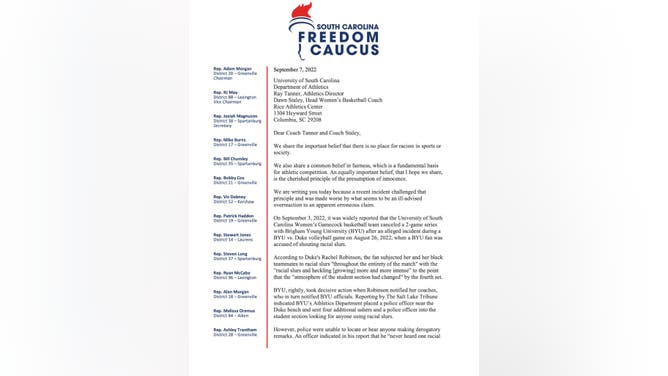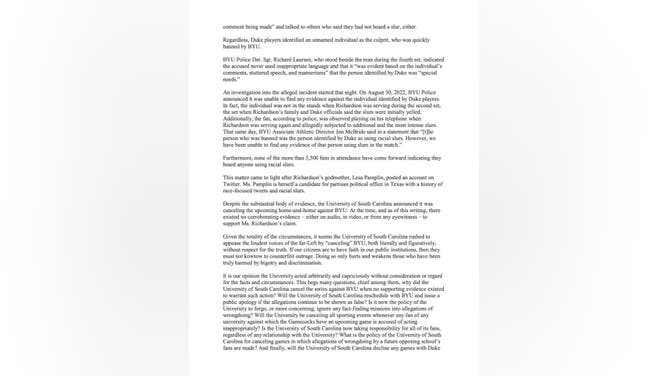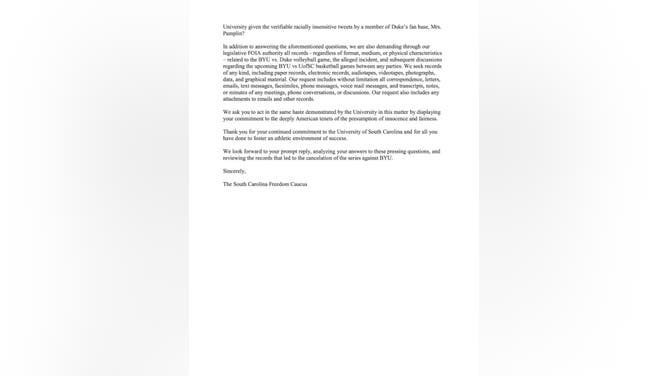Lawmakers Question University of South Carolina Over BYU Cancellation
As the story of the alleged incident of racism at the Duke-BYU women's volleyball match has unfolded, significant holes in Rachel Richardson's original story have emerged.
An independent student newspaper dug deeper than any national news outlet, who all predictably repeated Richardson's version of events without question. The paper wasn't able to find a single source in or around the student section who was willing to say that they heard any slurs yelled during the game.
Local police also acknowledged they were unable to confirm Richardson's account.
Another officer stationed in the arena said that the fan who was banned by BYU likely had special needs and was not heard to be yelling anything inappropriate towards the Duke players.
Essentially, every piece of available evidence that's emerged since the allegations have contradicted the original story.
But that didn't stop South Carolina women's basketball coach Dawn Staley from an impressive bit of virtue signaling, cancelling a scheduled series with BYU that was supposed to begin later this year:
Now, several lawmakers in South Carolina are speaking against Staley and the University's decision to withdraw from the series.
The South Carolina Freedom Caucus sent a letter to the athletic director and Staley, describing that they believe the team made an "ill-advised overreaction to an apparent erroneous claim."

The lawmakers brought up the same issues that OutKick has extensively reported on, namely that no one has corroborated the original story, the police have been unable to identify any evidence tying the person banned by BYU to racial slurs, and that the matter came to light thanks to Richardson's godmother, Lesa Pamplin.
Pamplin has a history of racist remarks herself, making it especially concerning that the allegations were accepted without question:

As they note, the University "rushed to appease the loudest voices of the far-Left by 'canceling' BYU, both literally and figuratively."
Many universities and volleyball teams joined in the virtue signaling parade, showing support for Richardson even as her account unraveled.
The letter concludes with several important questions, namely asking if South Carolina will be canceling games against Duke, given Pamplin's history of racist remarks, and demanding the release of internal communications regarding the incident:

This letter summarizes the significant issues around the original story and highlights how the rush to judgment can often lead to inaccurate, unjustified decisions.
It's also important that those in authority don't let activist school administrators or athletic coaches get away with inaccurate virtue signaling that hurts others.
To an extent, BYU did bring this on itself with its rush to judgment and desperation to avoid criticism from woke media members. But that doesn't excuse Staley's behavior, and the overwhelming support for Richardson among other volleyball teams could create further cancelations, based on something that possibly didn't happen.
Racism is inexcusable, but it's also inexcusable to rush to judgment without evidence. That's exactly what's happened here, and it seems like with every passing day, further holes emerge in the original narrative.
It's unlikely Staley or South Carolina will ever face consequences for their actions; as with most issues that involve virtue signaling, there's never a penalty for inaccurately hurting others, only for not going far enough.
But at the least, lawmakers in the state are demanding answers, which could create further transparency into how woke administrators and coaches make decisions based on pre-existing biases and not evidence.